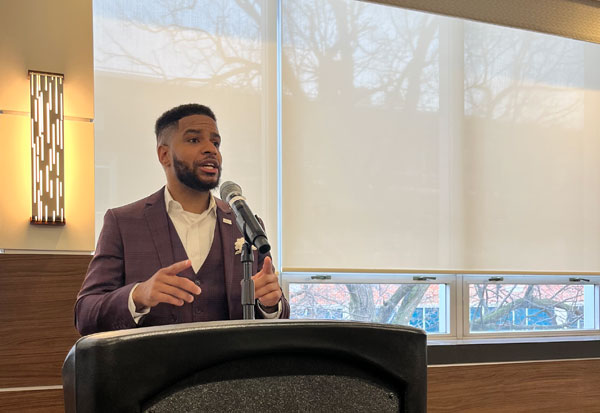President's Blog: From the Heart

Be Uncommon
By Eric F. Spina
I sat among colleagues at the 2023 Learning Teaching Forum and listened with rapt attention to Dr. Karlos Marshall as he shared his deeply personal educational journey and offered lessons for bringing out the best in every University of Dayton student.
The forum’s theme: the role of the University in inspiring hope and preparing future leaders who can effectively address the complex demands of our world.
Dr. Marshall’s message: give students the space and opportunity to be uncommon. Allow them to find their own voice. Don’t confine student learning to what’s solely on the syllabus. Show up for students in ways that are uncommon.
The audience: 180 faculty and staff who gathered to reimagine ways to educate the whole person and prepare students to lead for the common good.
“Let’s create an ‘uncommon’ collegiate environment where culturally responsive learning and teaching meet creativity, where entrepreneurial thinking and equity intersect, and where inclusion is the gateway to innovation,” said Dr. Marshall, who served at UD for eight years before being appointed as the Dayton Metro Library’s first chief diversity officer.
His own academic journey, he told us, was anything but common. As a teenage father, he left his hometown of Springfield, Ohio, to play football and study at Mercyhurst College, a predominantly white Catholic university in Erie, Pennsylvania. He soon transferred to Wittenberg to be closer to his son. Faculty mentors at Wittenberg, where he graduated with a degree in philosophy in 2013, and UD, where he later earned a master’s degree and doctorate in education, helped him realize his calling — and changed the trajectory of his life. As a graduate student, he co-founded the nonprofit Conscious Connect, a grassroots organization dedicated to eradicating urban “book deserts” in the Dayton-Springfield region.
Armed with Dr. Marshall’s challenge to teach in new and uncommon ways, faculty and staff left Kennedy Union ballroom to either lead or participate in 30 interactive workshops. I was impressed by the richly diverse program that included panels, individual and group presentations, and conversations. Kudos to the planning committee, led by Dr. Karen Lovett, director of experiential learning, for weaving together a daylong interdisciplinary forum that explored contemporary challenges in the classroom.
As one small sample of offerings, Dr. Molly Sayre discussed the need to develop diversity and inclusion strategies for enrolling more students of color in community-engaged learning courses. Theologian Vincent Miller talked about “teaching hope” as we prepare students to address complex issues, such as climate change and extreme poverty globally. Other sessions focused on building student resiliency and engagement.
Universities routinely offer teaching forums for their faculty. Here, on our campus, faculty and staff work together to design ways to provide a holistic education to students. It’s a differentiator — and it’s what made this Learning Teaching Forum so powerful.
You might even call it uncommon.
